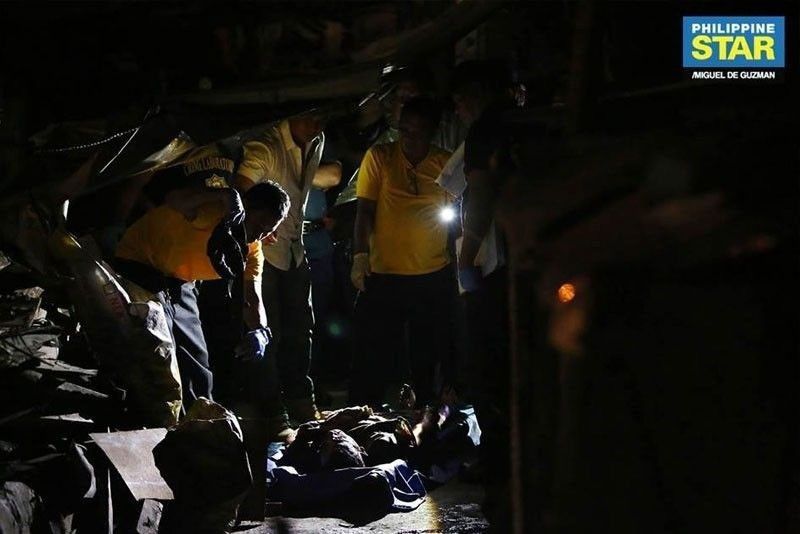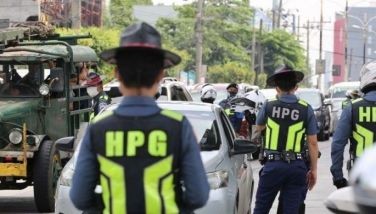‘Initial DOJ report won’t deter ICC from investigating EJKs’

MANILA, Philippines — The initial report of the Department of Justice (DOJ) on the suspicious deaths of alleged suspects at the hands of police officers during anti-drug operations is not enough to deter the looming investigation of the International Criminal Court (ICC) into thousands of extrajudicial killings in the country, Senate Minority Leader Franklin Drilon said yesterday.
Drilon, a former justice secretary, pointed out that the DOJ managed to look into only 52 cases out of the nearly 6,000 incidents of extrajudicial killings (EJKs), even as the Duterte administration insists that the ICC has no jurisdiction over the Philippines.
Malacañang said apart from the fact that President Duterte pulled out the country from the Rome Statute – the treaty that created the ICC – the country’s justice system is working as shown by the DOJ’s probe into alleged EJKs due to the administration’s war on drugs.
“Of course that (working justice system) is their (administration) defense. Whether the ICC will believe that or not, we still cannot say for sure at this point,” Drilon told dwIZ in Filipino.
He said whether or not a country has a credible justice system is one of the ICC’s parameters to proceed or not with an investigation, but it is not the only consideration for the international court.
“There are many other bases as well (to proceed to an investigation), like threats and control of government agencies to show that the justice system is not working,” he said.
He said it was only after five years that the administration started to investigate such cases, despite a strong clamor in the country and from the international community, when EJKs started to rise at an alarming rate.
Drilon recalled that during the early years of the administration, the Senate Blue Ribbon committee investigated the rising number of EJKs, and he had asked for the police after operations report of hundreds of cases.
The Philippine National Police (PNP) submitted the after operations report to the committee, only to retrieve them in less than 24 hours, citing the need to seek permission from Malacañang – much to the consternation of senators as the records are considered public documents.
Last September, the ICC ordered the conduct of an inquiry into the cases filed against Duterte for alleged crimes against humanity in the course of waging his campaign against illegal drugs, following a request from the court’s prosecutor, Fatou Bensouda, prior to her leaving office.
In her request, Bensouda said that after analyzing a large amount information, she determined “there is a reasonable basis to believe that the crime against humanity of murder has been committed on the territory of the Philippines between 1 July 2016 and 16 March 2019 in the context of the Government of Philippines ‘war on drugs’ campaign.”
Bensouda’s successor, Karim Khan, vowed to conduct an independent and impartial probe to “uncover the truth and aim to ensure accountability” as well as bring justice to the victims.
Duterte earlier said he would not participate in any ICC investigation as the body no longer has jurisdiction over the country. Duterte in 2018 pulled the Philippines out of the Rome Statute. The withdrawal took effect in 2019.
The ICC, however, said it still has jurisdiction with respect to the alleged crimes that occurred in the country from 2016 to 2019.
Limited information
Meanwhile, human rights group Amnesty International said “the DOJ’s recently released matrix – containing limited information from its review of a mere 52 cases among thousands of deaths during police anti-drug operations – is another deeply disappointing indicator of the continuing lack of accountability for the thousands of unlawful killings and other crimes under international law, and human rights violations committed under the so-called ‘war on drugs.’”
The group remains concerned that Philippine authorities, including the DOJ’s current review, continue to show no meaningful progress toward ensuring access to justice and reparations for victims, nor provide a clear commitment to end its bloody crackdown on illicit drugs.
This investigation by the DOJ comes amid further domestic and international demands for accountability for crimes under international law and human rights violations committed as part of the “war on drugs” launched by the Duterte administration in 2016.
The UN Human Rights Council, while falling short of mandating an investigative mechanism, recently provided a grim update on the country’s human rights situation as part of the High Commissioner for Human Rights’ report in September this year.
Moreover, within the country itself, there are increasing calls from civil society and the public for candidates in the upcoming May 2022 national elections to condemn and propose more humane and human rights compliant alternatives to address the health and human rights impacts of the use and sale of drugs, the group pointed out.
“Despite mounting domestic and international concerns, the DOJ review is grossly insufficient and insincere. When it was first announced by the Philippine government in July 2020, this review’s timing and circumstances were clearly designed to shield the government from international scrutiny and includes the very agencies involved in the killings and other human rights violations.Under international standards, investigations into the unlawful use of force by the police must be carried out by a department or unit that has no link with the officials under investigation, to guarantee the independence and impartiality of the process,” the group said in a statement.
The group added, “Despite tens of thousands of killings during police anti-drug operations, majority of which are known to be extrajudicial executions, the matrix published by the DOJ examines merely 52 cases, the only ones submitted by the PNP to the DOJ for review.
Police killings in anti-drug operations continue to be reported even during the COVID-19 pandemic, but both the police and the DOJ have yet again failed to launch credible investigations into the recent killings.”
Further, Amnesty International said, “The DOJ’s documentation of the 52 cases contradicts the police narrative that people killed in police operations fought back, thereby justifying the use of lethal force.
It illustrates the brutality with which anti-drug operations are carried out by the police: many victims suffered multiple gunshot wounds, some at close range and some to the head, showing clear intent to kill.
The review identifies grave lapses in police procedures, such as the absence of autopsy reports, ballistics or paraffin tests, medical or death certificates and other requisite forms and reports.”
It added, “The methodology of the DOJ’s investigation is deeply concerning. The details of the full review remain unavailable to the public, with the report itself classified as a confidential memo to the President by the DOJ.”
The DOJ also said it is still consulting with the PNP – whose members are widely believed to be behind the killings and other human-rights violations – on whether families of victims could be given copies of the report.”
The Commission on Human Rights was not involved in the review process, contrary to the Philippine government’s earlier commitment.
To date, there have been no concrete proposals for redress and reparations for victims’ families, who have also not been interviewed or otherwise included in the preparation of the report, nor have they been able to access the results of the review other than through this recently released matrix, the statement read.
According to the group, these procedural problems, the disturbingly small number of cases included in the report and the significant delay in publishing the results of the review cause grave concern that the rest of the investigative process will be similarly flawed and will lead to neither justice for the families of victims nor bring an end to the anti-drug campaign that has left a legacy of violence, death and suffering. – Rhodina Villanueva
- Latest
- Trending

























